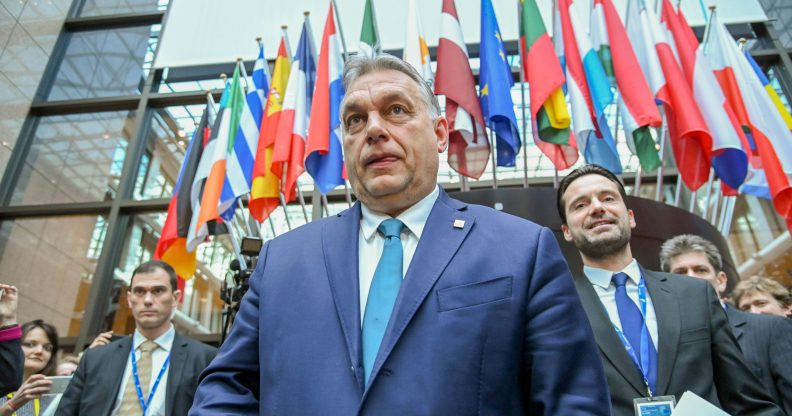UN condemns countries that are using coronavirus crisis to persecute and strip away the rights of LGBT+ people

Viktor Orban in Brussels in February. His move to strip trans people of their human rights has been condemned by more than 60 MEPs. (Riccardo Pareggiani/NurPhoto via Getty Images)
Viktor Orban in Brussels in February. His move to strip trans people of their human rights has been condemned by more than 60 MEPs. (Riccardo Pareggiani/NurPhoto via Getty Images)
The United Nations has issued a firm warning to its member states not to use the coronavirus crisis as an excuse to undermine LGBT+ rights.
Michelle Bachelet, the UN High Commissioner for Human Rights, noted “an increase in homophobic and transphobic rhetoric” during the pandemic.
She singled out Hungary for particular criticism, after the far-right leader Viktor Orbán used his emergency coronavirus powers to push through a bill that would strip away trans rights.
“In at least one country, the state of emergency has been used to propose a decree that would prevent transgender people from legally changing their gender in identity documents,” Bachelet said.
Luxembourg MEP Marc Angel agreed that this attack on the trans community is “outrageous and deliberate”, adding: “This move does not only intentionally silence the trans community – it seeks to erase it and deny its existence.”
Bachelet highlighted several reports of police using COVID-19 directives to attack and target LGBT+ organisations, even raiding their offices.
“LGBT+ people have previously been blamed for disasters, both manmade and natural, and there are scattered reports of this happening in the context of the COVID-19 pandemic,” she said.
These attacks against the LGBT+ community are being led by political and religious leaders of all faiths, capitalising on a rising tide of populism that has seen a worrying increase in homophobic hate speech across Europe.
Poland has also acted against the LGBT+ community during the coronavirus lockdown, as its parliament considers a ‘Stop Pedophilia’ law which seeks to criminalise those who teach sex education by falsely linking homosexuality with paedophilia.
Bachelet also pointed out that LGBT+ people are more likely to struggle with economic hardship during the pandemic as they are disproportionately more likely to be unemployed or live in poverty.
And she noted the danger LGBT+ people face from domestic violence as the coronavirus traps them at home in less than supportive environments.
“Due to stay-at-home restrictions, many LGBT+ youth are confined in hostile environments with unsupportive family members or cohabitants. This can increase their exposure to violence, as well as their anxiety and depression,” she said.
The UN has provided a six-point plan of action to address these issues and ensure LGBT+ people are “taken into consideration and their voices heard when addressing the pandemic”.

